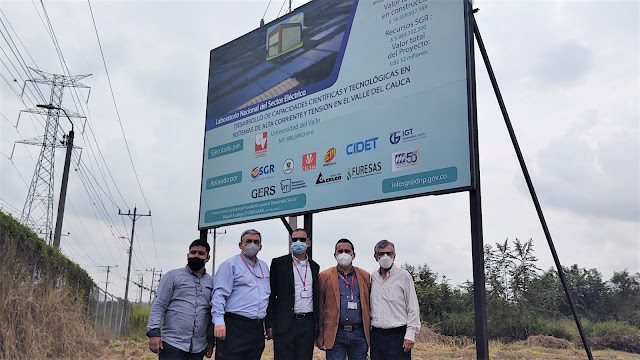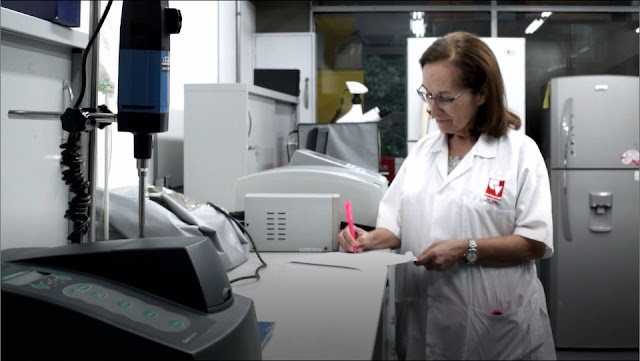Since September 21, 2021, the team of the Central Communications Node (NCC) of the Faculty of Engineering of the Universidad del Valle (Univalle) have published 26 notes on the research work of the Faculty, including 13 in Spanish and 13 versions in English , in order to internationalize the good work that Univalle researchers do. Below are a proof of each note and a link to the entire note.
LAB VISITS
The following stories are the result of visits by the NCC team to the laboratories of the Faculty of Engineering of the Universidad del Valle. At each visit, the NCC team talks with professors and students, taking photos and exploring the lab.
School of Mechanical Engineering : Electric Car Industry
 |
| Photo: Students from the Universidad Del Valle Automotive Project. Credit: Edgar Bejarano / Univalle |
School of Civil y Geomatic Engineering: Tearing Down Walls
 |
| Photo: The experimental team at the School of Civil and Geomatic Engineering. Credit: G-7 research group |
School of Chemistry: Anti-cancer Technology
 |
| Photo: Professor Camargo with the chamber used to help prepare the TiO2-m.Credit: Andrew James (NCC-Univalle) Credit: Andrew James (NCC-Univalle) |
Read More: Colombian Researchers Are Killing Cancer Cells With Patents and Patience
School of Civil y Geomatic Engineering: Moon Tech For Housing
 |
| Fotomontaje de la superficie lunar con un paisaje del departamento del Cauca, Colombia. Crédito: NASA/Wikimedia/Édgar Bejarano/NCC Univalle. |
As a doctoral student in the United States, Daniel Gomez Pizano —now a professor at the Faculty of Engineering of the Universidad del Valle— analyzed structures on the lunar surface constructed by 3D printing, from local materials. Now he has a well-funded research project to do the same with the remote communities of Cauca, in southern Colombia.
Over four years, there will be $9.56 billion Colombian pesos (COP) (about $US 2.5 million) in funding from the General System of Royalties of the department (state) of Cauca, $3.31 billion COP ($US 862,000) from the University Del Valle and $180 million COP ($US 47,000) from the University of Cauca.
SITE VISITS
CINARA Institute: Water Security
 |
| Photo: The construction site in Puerto Mallarino, Valle del Cauca, September 16, 2021. Credit: Andrew James (NCC-Univalle). |
School of Electric y Electronic Engineering: Lab Launch
 |
| Photo: Researchers from the School of Electrical and Electronic Engineering and Rector of the Universidad del Valle. |
With the Governor of the Department of Valle del Cauca, Dra. Clara Luz Roldán, the managers of the regional electricity industry and engineers from the Universidad del Valle (Univalle) in attendance, an ambitious project was launched to improve scientific and technologies of the electricity industry in Colombia, as well as its competitiveness in the international market: the planned 2022 construction of the National Electricity Sector Laboratory.
According to Professor Carlos Lozano of the School of Electrical and Electronic Engineering at Univalle, the launch event that took place on November 26, 2021 marks another great step towards the dream of a laboratory dedicated to conducting specialized tests on different equipment in the electrical industry: transformers, cables, insulators and other equipment used in electrical networks.
Read More: Transformative Electrical Research Lab Launches in Southern Colombia
ENGINEERING WEEK 2021
The following stories are summaries of articles published under the branding of Engineering Week 2021, (November 24-26), with the theme of "Women in engineering: research, entrepreneurship and innovation for the development of the region."
Highlights of Engineering Week 2021
Challenges For Women in STEM
To celebrate Engineering Week 2021, which will be this week between November 24-26, we spoke with Professor Laura Sofía Rodríguez Pulecio, from the School of Systems and Computing Engineering within the Faculty of Engineering of the Universidad del Valle (Univalle).
"The mission of the week is to make the work of women in engineering more visible, talk about the gender gaps that still persist in our society and how engineering can contribute to reducing these gaps... and talk about what are the factors that even today there is a low participation of women in these areas,” said Professor Rodríguez.
Exploring the challenges associated with engaging women in STEM (Science, Technology, Engineering and Mathematics) is the focus of the week's theme, which is “Women in Engineering: Research, Entrepreneurship and Innovation for the development of the region."
Read More: Women in STEM are the stars of Engineering Week 2021 at Universidad del ValleWOMEN EN STEM
School of Food Engineering: White Protein Drink
 |
| Photo: Aida Rodríguez de Stouvenel, director of the White Protein Project and researcher at the School of Food Engineering. Credit: Proyecto Proteína Blanca |
School of Materials Engineering: Geopolymers For Construction
 |
| Photo: Professor Ruby Mejia, director of the Composite Materials Group. Credit: Edgar Bejarano / Univalle |
Read More: Trash To Treasure: How Materials Engineers In Cali, Colombia Built Better Building Materials
School of Mechanical Engineering: Impact of wear, tear and corrosion
 |
| Profesor Sara Aida Rodríguez, researcher at the Fatigue and Surfaces research group Crédito: Andrew James/NCC/Univalle |
Female engineers from the Universidad del Valle Faculty of Engineering are leading efforts to reduce the impact of wear, tear and corrosion, in order to save money, lives and the planet.
Professor Sara Aida Rodríguez, researcher at the Fatigue and Surfaces research group, said that one of her lines of research is focused on the practical study of tribology, the science of the interaction of surfaces under different conditions, from a prosthesis within the human body, even a hydroelectric turbine turning sediment-filled water.
School of Industrial Engineering: The Logistics of Health
 |
| Photo: Professor Elena Valentina Gutiérrez from the Logistics and Production Research Group Credit: Ana Valdes / School of Industrial Engineering / Universidad del Valle |
Researchers from the Faculty of Engineering of the Universidad del Valle (Univalle) are using computational modeling to improve the logistics of health systems.
Long before the Covid-19 pandemic, researchers, health administrators and medical professionals realized that the logistics and management of the health system in Colombia were changing to provide more services outside of hospitals or clinics, according to Professor Elena Valentina Gutiérrez, a researcher at the Logistics and Production research group at Univalle..
Read More: This Colombian Engineer Uses Logistics To Help Health Services Run Better
EIDENAR: Engineering Helping Communities
 |
| Photo: Professor Irene Vélez-Torres. Credit: Universidad del Valle. |
Colombian researcher Irene Vélez-Torres from the Universidad del Valle (Univalle) works with research groups in the United States and Europe to improve the lives of communities in southwestern Colombia, particularly on the issue of detecting mercury contamination.
In October,Vélez-Torres, Titular Professor of the School of Natural Resources and Environmental Engineering (EIDENAR) at Univalle, completed a transdisciplinary project in the United States, via a Fulbright scholarship.


Comentarios
Publicar un comentario